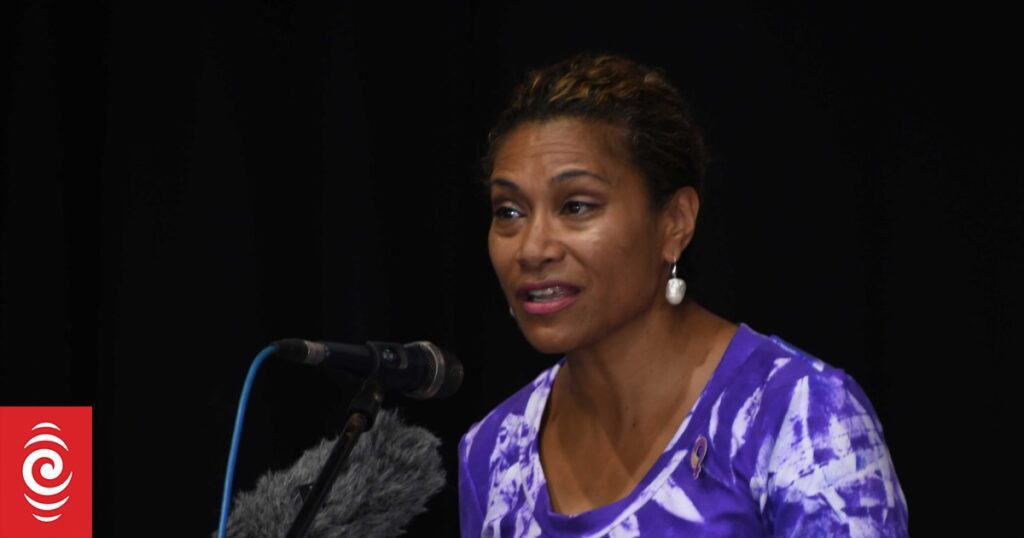Lynda Tabuya
Photo: Facebook / Fiji Government
The Fiji Council of Social Services (FCOSS) believes that the recent media scrutiny surrounding Lynda Tabuya will not discourage women from pursuing political careers.
Tabuya was removed from her position as the Minister for Women and Children on December 26, after a private video of her dancing, intended for her husband, was made public.
This intimate video, leaked following a hacking incident, quickly gained virality, drawing extensive criticism towards the former cabinet member.
The situation has sparked significant discussions about the treatment of women in politics, particularly when their private lives become public, and whether such controversies could deter other women from stepping into political roles.
Vani Catanasiga, Director of FCOSS, highlighted that “there are standards to uphold” for public figures. She emphasized, “In our context, based on my conversations with women, the media attention does not act as a deterrent for young girls entering politics; instead, it seems to empower them.”
In the Limelight
The leaked video is merely the latest in a series of controversies surrounding the Member of Parliament.
In January 2024, she faced removal as the deputy leader of the People’s Alliance Party (PAP) amidst allegations of an affair with Education Minister Aseri Radrodro.
This alleged affair reportedly involved substance use during a parliamentary study trip to Melbourne in 2023.

Fiji’s now dismissed education minister Aseri Radrodro, left, and women’s and children’s minister Lynda Tabuya, right. Prime Minister Sitiveni Rabuka, center, stated he would refrain from comments on social media.
Photo: RNZ Pacific
Tabuya has denied the allegations, asserting they are politically driven.
She stated, “This is not unexpected, as these very individuals opposed my appointment to deputy party leader prior to the 2022 elections, seizing this opportunity to attack.”
Double Standards and Gendered Violence
Tabuya’s firing has ignited discussions about the differing standards applied to men and women in politics, as well as the gender-based violence that persists in Fiji’s political landscape.
Many argue that women, especially those in prominent positions, are subjected to stricter moral expectations.
Tabuya has characterized the video leak as a form of cybercrime and gender-based violence, calling it “a severe instance of cyberbullying that must cease if we are genuinely dedicated to eradicating violence against women and girls in Fiji.”
Reporting by ABC Pacific on December 30 received public backlash, with some condemning Tabuya’s actions, deeming her behavior unbecoming of a leader.
Others, like Sudesh Raju, expressed concern over governmental integrity, asking, “What if all ministers acted similarly? What will be the integrity of our Government?”
Yerusha Mai Viti insisted that “there are no gendered moral standards.” One commenter, Susana Manoa, lamented, “Is she not human? Where are her human rights? It’s disheartening that she lost her ministerial role without any evidence of how the video was leaked. It feels like kicking someone while they’re down.”
Shamima Ali, a prominent advocate for women’s rights in Fiji, has consistently supported Tabuya, pointing out the lack of repercussions for Radrodro over his alleged indiscretions while Tabuya faced dismissal.
In April 2024, Radrodro was reinstated as Minister for Education just three months after Prime Minister Sitiveni Rabuka demoted him.
Nilesh Lali, executive director of Dialogue Fiji, took to social media to state that Tabuya was “being punished twice,” first through the invasion of her privacy and then with her dismissal. He remarked that the same individuals demanding Tabuya’s accountability conveniently ignore issues like racism and child abuse affecting Fijian society.
Political responses to the scandal have varied, with Rabuka removing her from the cabinet, claiming it was in the public’s best interest. Nonetheless, he urged victims of gender-based violence to seek help, stating, “Such actions contradict universal norms and respect for personal privacy.”
Uncertain Future
The future of Tabuya is uncertain, hinging on the results of a disciplinary hearing she attended three weeks ago, organized by the People’s Alliance party. The party is set to release its conclusions this week.


